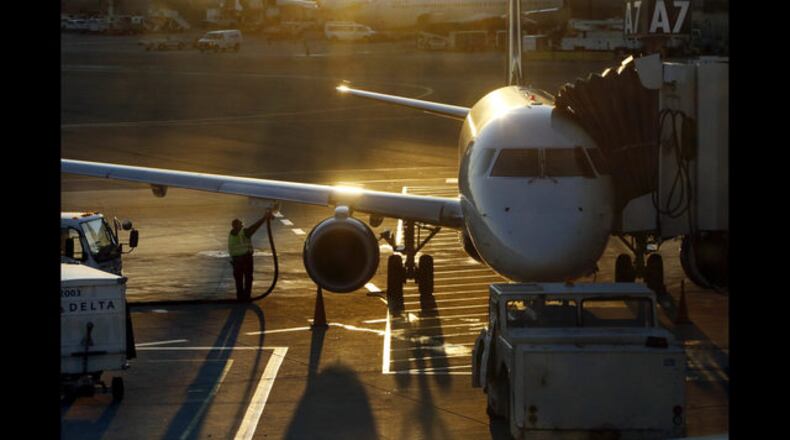Airlines have long faced a challenge when it comes to the environment.
As a significant source of carbon emissions, commercial aviation and its giant jet engines are a problem in efforts to tackle climate change.
Even without increased pressure to address the environmental impact, air carriers have a huge motivation to reduce their emissions for their own financial benefit. Jet fuel makes up one of the largest costs for an airline, and reducing the use of fuel can bring a huge benefit to the bottom line.
Yet there's no zero emissions solution for airliners on the horizon anytime soon. In order to move hundreds of people across the globe in a matter of hours, planes burn thousands of gallons of jet fuel.
One path big emitters have taken is to buy carbon offsets – which don’t reduce the company’s emissions, but fund activities by other organizations to offset some of the negative effects of their emissions.
Atlanta-based Delta Air Lines since 2012 has opted to cap its carbon emissions at 2012 levels – not by capping or reducing its flying, but by purchasing carbon offsets.
“With fuel being our second-largest operating expense and our largest environmental impact coming from carbon emissions, we realized some time ago that there was more that we needed to do in this space,” said Christine Boucher, Delta’s chief compliance officer who has managed sustainability efforts at the company. “Of course we continue to grow as an airline but we don’t want to have an additional impact on the environment beyond that 2012 level.”
Since 2012, Delta has purchased more than 12 million carbon offsets for projects in areas it flies to -- equivalent to the emissions from 1.7 million cars.
On Earth Day 2019 -- Monday, April 22 -- Delta says it will offset the emissions of flying more than 300,000 passengers, by buying nearly 50,000 carbon offsets.
Money from buying those carbon offsets will go toward Conservation Coast, which works to protect rainforests in Guatemala.
“It’s always a challenge to raise funds for forest preservation,” said Marco Cerezo, general director of FUNDAECO, which runs the Conservation Coast project. The project protects rainforests through community patrols, surveillance, biological monitoring and camera traps to monitor hunters and loggers. A forest protection payment program pays small amounts to residents to dissuade them from cutting down trees to grow corn.
The project gets carbon credits equivalent to the greenhouse gases that would have been emitted if the forest had been destroyed, and those credits are sold to companies like Delta. Airlines are a big buyer of carbon offsets, and Cerezo expects the shipping industry may also move in the same direction.
On some flights Monday, Delta is also distributing to passegers paper airplane cutouts made from seed paper with information on its environmental efforts. The seed paper sprouts wildflowers when planted in the ground.
The airline is doing the Earth Day campaign in part to encourage passengers to buy carbon offsets to offset the impact of their flights.
Delta says in 2007 it became the first U.S. airline to offer the option for passengers to buy carbon offsets for their flight, but few opt to pay for it. The airline says offsetting a roundtrip ticket from Atlanta to New York costs less than $5.
Meanwhile, the airline industry faces external pressure to better address its carbon emissions.
Boucher noted the industry is studying biofuels and the possibilities for electric aircraft.
“There’s a lot of innovation,” Boucher said. But the challenges include making biofuel scalable for the far-flung array of airline operations around the world currently fueled with jet fuel infrastructure, and making electric aircraft commercially viable.
Delta fuel use
2010 3,093,665,004 gallons
2011 3,133,172,712 gallons
2012 3,081,630,188 gallons
2013 3,160,445,926 gallons
2014 3,261,989,901 gallons
2015 3,332,877,920 gallons
2016 3,405,591,412 gallons
2017 3,430,753,328 gallons
Source: Bureau of Transportation Statistics
About the Author
The Latest
Featured



